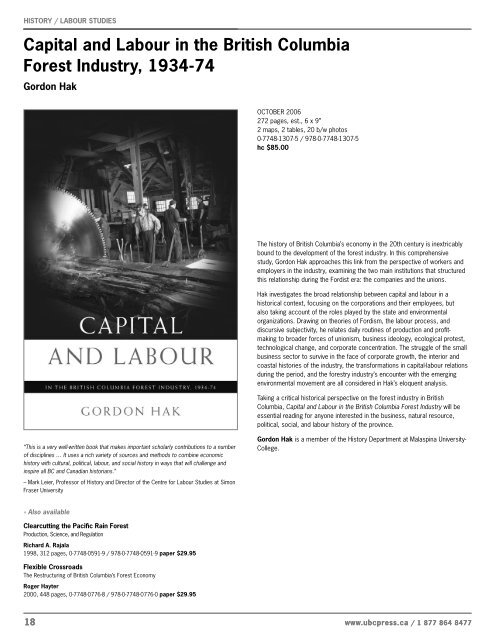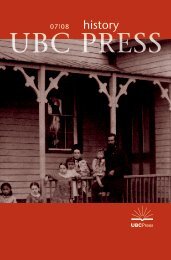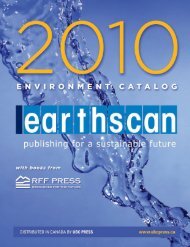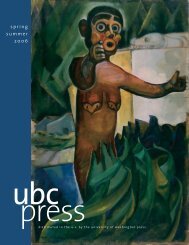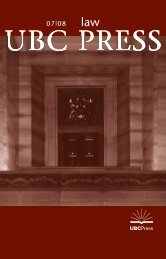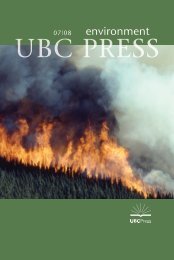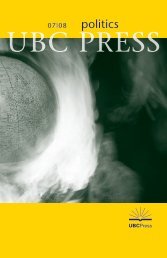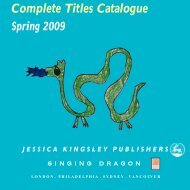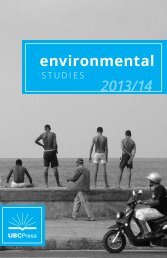The Future of Canada's Water - UBC Press
The Future of Canada's Water - UBC Press
The Future of Canada's Water - UBC Press
You also want an ePaper? Increase the reach of your titles
YUMPU automatically turns print PDFs into web optimized ePapers that Google loves.
HISTORY / LABOUR STUDIES<br />
Capital and Labour in the British Columbia<br />
Forest Industry, 1934-74<br />
Gordon Hak<br />
OCTOBER 2006<br />
272 pages, est., 6 x 9”<br />
2 maps, 2 tables, 20 b/w photos<br />
0-7748-1307-5 / 978-0-7748-1307-5<br />
hc $85.00<br />
<strong>The</strong> history <strong>of</strong> British Columbia’s economy in the 20th century is inextricably<br />
bound to the development <strong>of</strong> the forest industry. In this comprehensive<br />
study, Gordon Hak approaches this link from the perspective <strong>of</strong> workers and<br />
employers in the industry, examining the two main institutions that structured<br />
this relationship during the Fordist era: the companies and the unions.<br />
Hak investigates the broad relationship between capital and labour in a<br />
historical context, focusing on the corporations and their employees, but<br />
also taking account <strong>of</strong> the roles played by the state and environmental<br />
organizations. Drawing on theories <strong>of</strong> Fordism, the labour process, and<br />
discursive subjectivity, he relates daily routines <strong>of</strong> production and pr<strong>of</strong>itmaking<br />
to broader forces <strong>of</strong> unionism, business ideology, ecological protest,<br />
technological change, and corporate concentration. <strong>The</strong> struggle <strong>of</strong> the small<br />
business sector to survive in the face <strong>of</strong> corporate growth, the interior and<br />
coastal histories <strong>of</strong> the industry, the transformations in capital-labour relations<br />
during the period, and the forestry industry’s encounter with the emerging<br />
environmental movement are all considered in Hak’s eloquent analysis.<br />
Taking a critical historical perspective on the forest industry in British<br />
Columbia, Capital and Labour in the British Columbia Forest Industry will be<br />
essential reading for anyone interested in the business, natural resource,<br />
political, social, and labour history <strong>of</strong> the province.<br />
“This is a very well-written book that makes important scholarly contributions to a number<br />
<strong>of</strong> disciplines … It uses a rich variety <strong>of</strong> sources and methods to combine economic<br />
history with cultural, political, labour, and social history in ways that will challenge and<br />
inspire all BC and Canadian historians.”<br />
Gordon Hak is a member <strong>of</strong> the History Department at Malaspina University-<br />
College.<br />
– Mark Leier, Pr<strong>of</strong>essor <strong>of</strong> History and Director <strong>of</strong> the Centre for Labour Studies at Simon<br />
Fraser University<br />
» Also available<br />
Clearcutting the Pacific Rain Forest<br />
Production, Science, and Regulation<br />
Richard A. Rajala<br />
1998, 312 pages, 0-7748-0591-9 / 978-0-7748-0591-9 paper $29.95<br />
Flexible Crossroads<br />
<strong>The</strong> Restructuring <strong>of</strong> British Columbia’s Forest Economy<br />
Roger Hayter<br />
2000, 448 pages, 0-7748-0776-8 / 978-0-7748-0776-0 paper $29.95<br />
18<br />
www.ubcpress.ca / 1 877 864 8477


